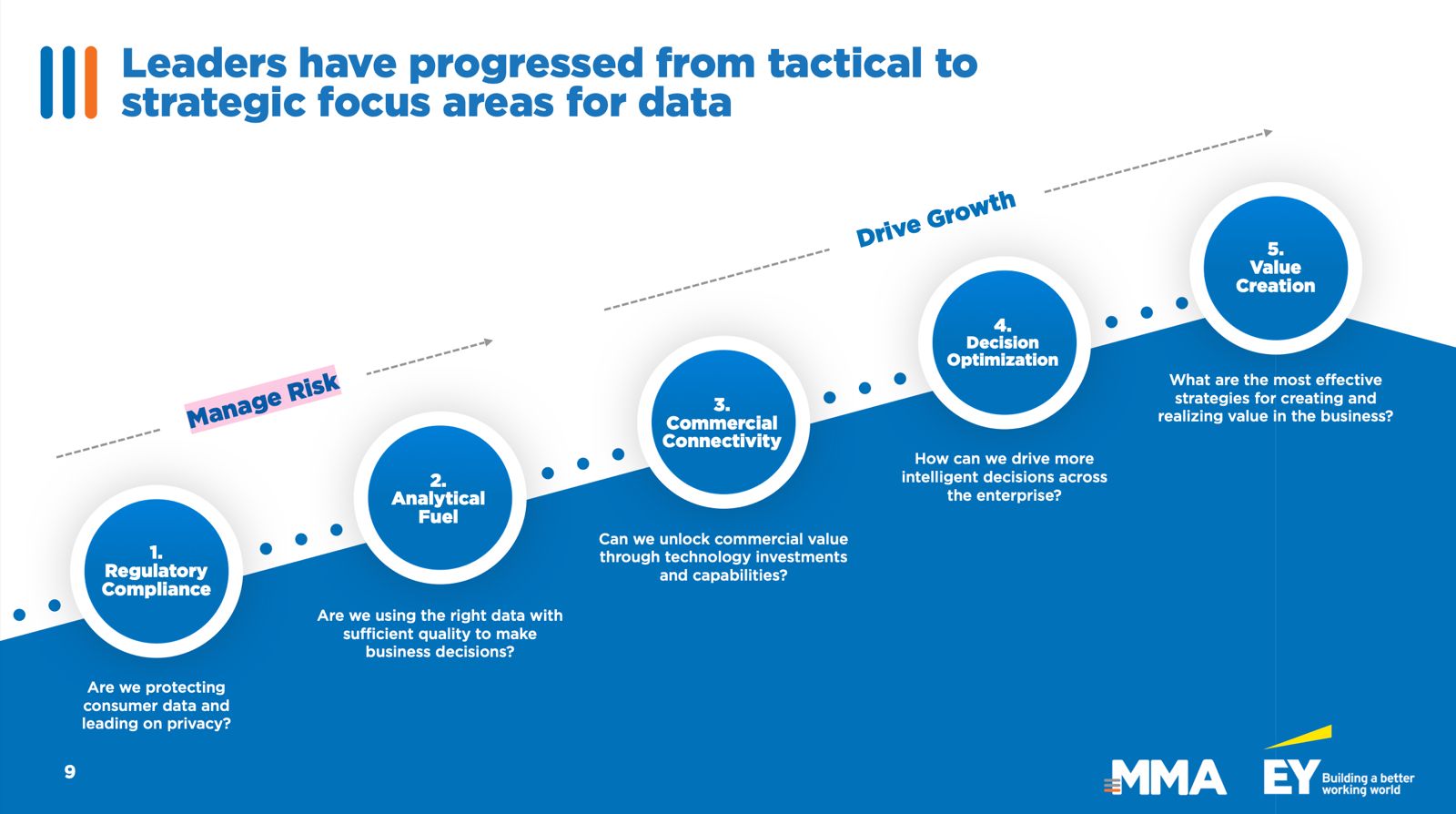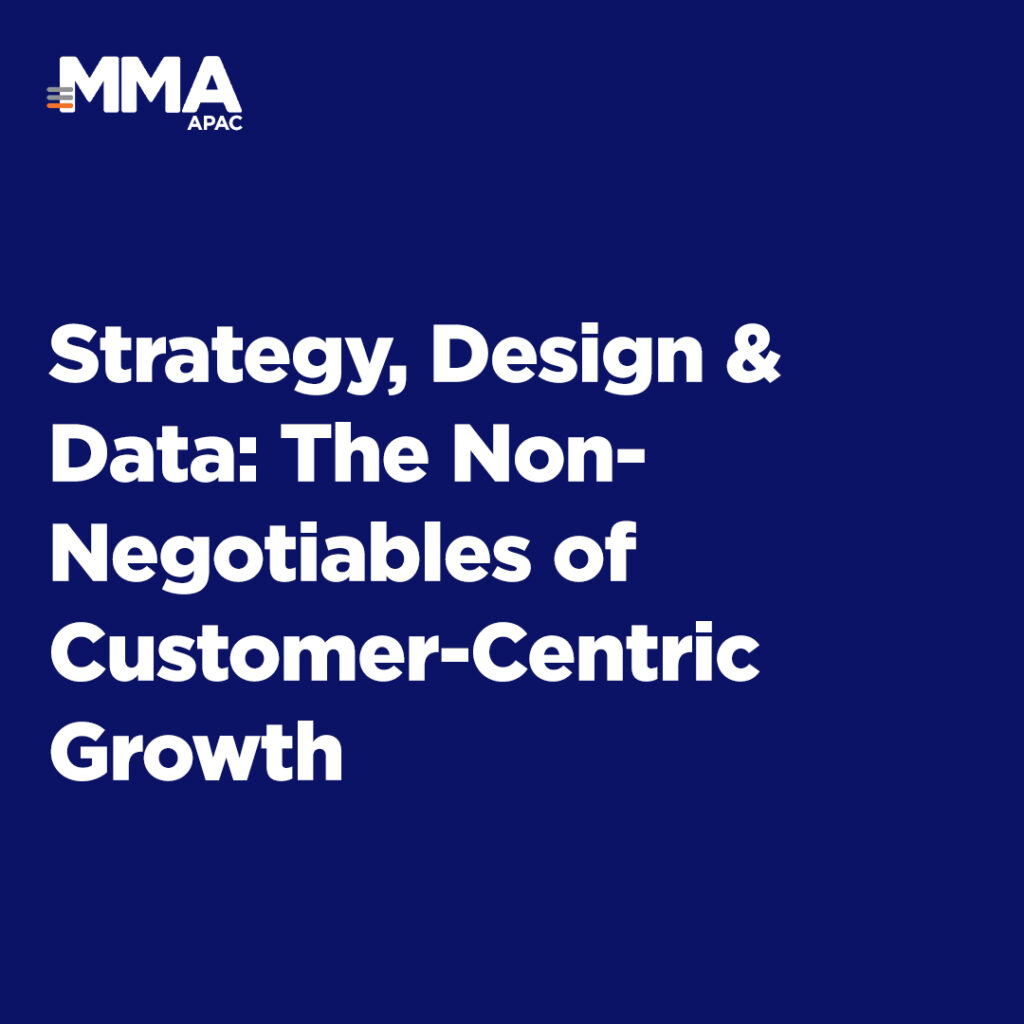
The Marketing Measurement & Analytics (MMA) Data Maturity Framework, created through strategic partnership with EY, offers marketers a comprehensive blueprint for transforming data obstacles into competitive advantages. This framework addresses critical areas including regulatory adherence, analytical capabilities, integration systems, strategic optimization, and business value generation.
Framework Foundation and Strategic Value
The enhanced Data Maturity Framework empowers marketing organizations to:
- Successfully adapt to dynamic data environments
- Establish performance benchmarks across privacy-first advertising and multi-channel campaigns
- Recognize critical improvement areas and growth potential

Regulatory Excellence
Governance Leadership
Despite growing emphasis on data activation, robust governance remains fundamental. Effective governance frameworks guarantee regulatory adherence, responsible data practices, and comprehensive risk mitigation while protecting consumer privacy and maintaining brand credibility.
Consumer Communication Strategies
Customer engagement regarding data transparency shows minimal advancement. Companies must actively demonstrate data utilization practices, streamline consent mechanisms, and expand consumer autonomy to establish lasting trust relationships.
Regulatory Adherence Standards
Compliance performance maintains consistency, with numerous marketers achieving sophisticated regulatory coordination. Sustained emphasis on compliance reduces operational risks and preserves brand integrity.
Cybersecurity Priority
Marketing organizations increasingly emphasize data protection, demonstrating elevated recognition of digital security risks and the critical nature of protecting confidential information.
Data Analytics Foundation
Information Access Obstacles
Data accessibility and practical application continue presenting substantial hurdles, emphasizing requirements for comprehensive data infrastructures to enhance strategic planning and operational execution.
First-Party Data Strategy Evolution
Organizations are expanding investments in proprietary data collection, recognizing its strategic importance for direct customer connections and precise market intelligence.
Consumer Intelligence Investment
Industry leaders significantly invest in customer profile analytics to enhance understanding of consumer patterns and deliver effective personalized marketing campaigns.
Multi-Source Data Strategy
Marketing teams leverage varied information channels, particularly online commerce, email systems, and customer loyalty initiatives, to develop complete perspectives on consumer preferences and purchasing patterns.
External Data Enhancement
Organizations regularly collaborate with third-party specialists and technology vendors to improve data accuracy and comprehensiveness, supporting more sophisticated analysis and strategic planning.
Integration Excellence
System Unification Challenges
Numerous companies encounter difficulties achieving successful data consolidation, emphasizing requirements for integrated data environments to eliminate operational barriers and enable comprehensive business intelligence.
Identity Management and Platform Investment
Financial commitment to identity resolution and Customer Data Platform technologies remains insufficient, though Data Leaders demonstrate excellence in these domains. Companies must accelerate investment in unified customer information management systems.
Cookie Alternative Readiness
Most marketing professionals remain inadequately prepared for cookie elimination, highlighting critical urgency to embrace alternative tracking technologies.
Unified Analytics for Strategic Insights
Consolidated data delivers comprehensive perspectives on customer touchpoints, operational performance, and business results, essential for strategic planning and customer experience optimization.
Strategic Decision Enhancement
Marketing Performance Metrics
Revenue expansion, competitive positioning, and brand strength continue as essential success indicators. Balanced attention to immediate results and sustainable outcomes drives long-term business success.
Financial Planning Approaches
Annual and quarterly budget cycles continue dominating, indicating opportunities for marketers to adopt more flexible and data-responsive resource allocation methodologies.
Analytics Investment Focus
Data analytics increasingly influences evidence-based decision-making, yet marketers identify requirements for expanded resources and specialized knowledge to fully capitalize on analytical capabilities.
Performance Attribution Methods
Multi-touch attribution systems and controlled testing approaches are extensively implemented but experience difficulties with consistency and verification. Standardized methodologies are required for reliable, practical insights.
Sustainable Growth Strategy
Organizational leaders maintain equilibrium between immediate operational efficiency and long-term brand development and return considerations, supporting continuous business expansion.
Business Value Generation
Strategic Vision Development
Most organizations are developing their data strategy vision, with limited companies achieving complete coordination between information strategy and comprehensive business objectives. Enhanced strategic integration remains critical.
Executive Leadership Transformation
Leadership recognizes data significance while organizational change progresses gradually. Advancing data sophistication requires revolutionary leadership approaches and organizational adaptability.
Collaborative Strategy Ownership
Various executive-level leaders commonly share data strategy responsibility, providing multiple viewpoints and thorough coordination with organizational priorities.
Outcome-Driven Data Application
Marketing professionals primarily utilize consumer information to increase revenue generation and operational effectiveness, demonstrating direct benefits of evidence-based strategic approaches.
High-Impact Application Areas
Customer segmentation, performance measurement, and campaign optimization deliver maximum recognized value from data investments, while cross-channel data exploitation represents significant unrealized potential for most organizations.
Through strategic adoption of the MMA’s Data Maturity Framework, marketing professionals can successfully address operational challenges, enhance organizational performance, and establish innovation-driven marketing strategies.



















